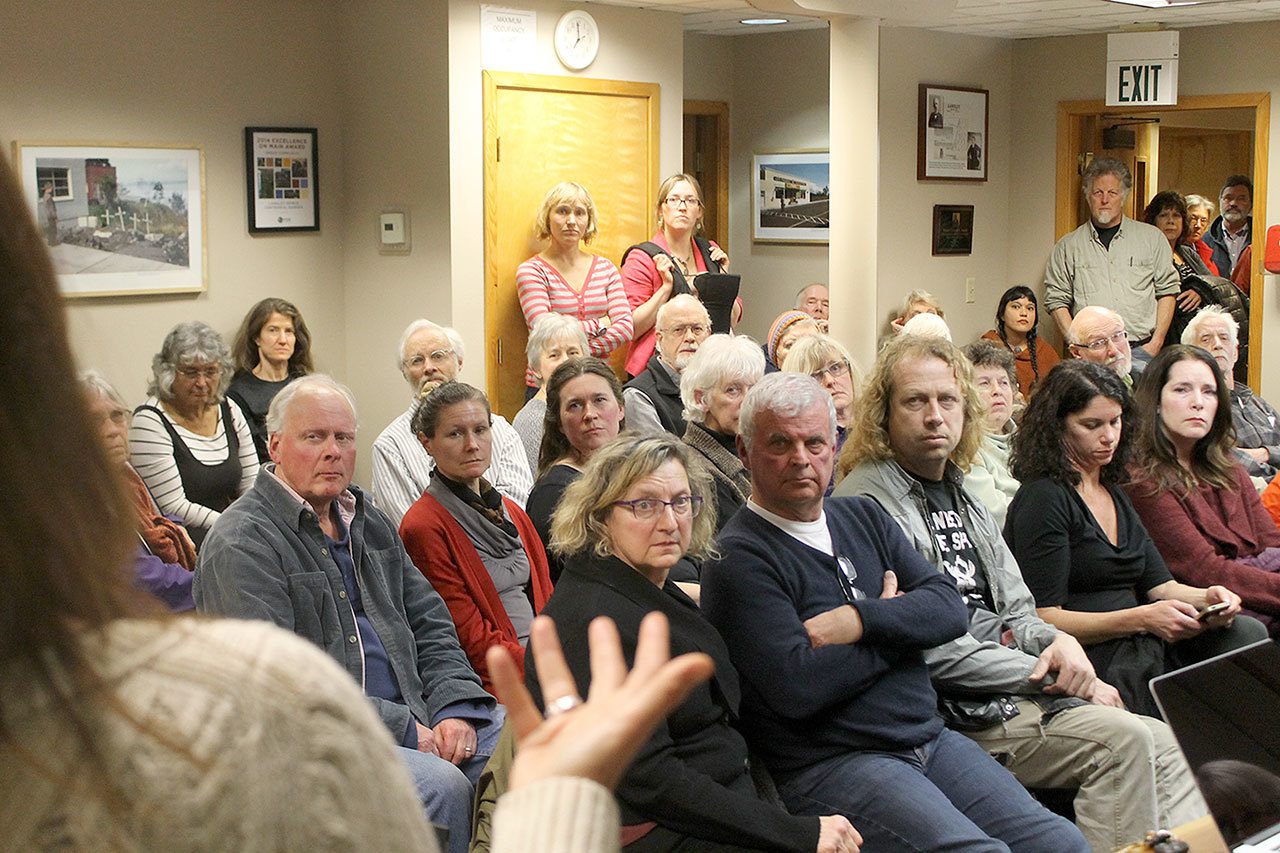The Langley City Council is expected to vote on a resolution Monday night at City Hall that could lead to sanctuary city talks being indefinitely tabled.
Advocates of the original idea say they will remain undeterred if the city council votes in favor of the resolution proposed by Langley’s ethics board. A public meeting organized by South Whidbey community members is scheduled from 6-8 p.m. on Feb. 9 at Langley United Methodist Church. The gathering aims to address questions about the ramifications of a sanctuary or “inclusive” city ordinance, while also debunking information that event organizers deem misleading. Panelists will also discuss the range of options for sanctuary city ordinances and resolutions and why it may be appropriate for Langley, according to a press release.
For Langley residents Ursula Roosen-Runge and Belinda Griswold, who are helping organize the meeting, President Donald Trump’s threats of cutting off federal funding to cities that do not cooperate with immigration officials are somewhat frivolous.
“Once a big city files suit against the administration over the executive orders, which is likely in the coming week, whatever opinion is issued by a court will bind not only the big cities but all “sanctuary” jurisdictions,” wrote Griswold, in an email to The Record. “Most likely that will be an injunction against withholding federal funds, and it will apply to all jurisdictions. So, instead of being endangered by the bravery of the big cities, little towns like Burien, Yakima, many (Washington) counties, and hopefully Langley, will be protected by the legal rulings those big cities obtain.”
They’re not the only ones questioning how much punishment can be doled out by Trump’s administration.
Hugh Spitzer, a University of Washington law professor, said the federal government has little power over cities because of the rights that state and their local governments have. He also cited Chief Justice John Roberts’ opinion in the 2012 “Obamacare” case, which stated that the federal government cannot “put a gun to the head of the states.” At the same time, states and cities cannot make federal governments bend much either.
“It’s very hard for the federal government to do very much or to retaliate against states and cities that choose not to actively collaborate with ICE (U.S. Immigration and Customs Enforcement),” Spitzer said.
Spitzer said the only time a city may be in trouble is if law enforcement attempts to prevent immigration officials from conducting their jobs. Spitzer also added there’s a chance that federal funding could be affected if Congress passes a law specifically tailored to address law enforcement that does not cooperate with Immigration and Customs Enforcement requests.
“What might count is when, and if, Congress passes a statute that says, ‘If your police won’t hold people when ICE requests, we’ll cut 5 percent of your law enforcement assistance money,” Spitzer said.
Spitzer also views advocates’ wish for Langley to become a sanctuary city as symbolic, as opposed to one with a clearly defined purpose, after being informed by a Record reporter that the Langley Police Department has not held an illegal immigrant or conducted work with Immigration and Customs Enforcement over the past decade.
“It doesn’t look like it will make a big difference,” Spitzer said. “I’d be really surprised if lots of undocumented immigrants start flooding into Langley.”
While the possible ramifications of becoming a sanctuary city are gray in terms of federal monies, some who oppose the proposal believe adopting sanctuary city status could create a bigger divide within the community.
“Our country has gotten so divisive and so either far left or far right,” said Langley resident Shawn Layng. “It just crushes me to see that.”
“I think specifically doing that just adds to the divisiveness. I don’t want to see that happen because it’s already bad enough as it is,” he added.
Joyce Riley, another Langley resident and Layng’s mother, said she would not support a sanctuary city status and agreed with City Councilman Bruce Allen’s assessment that Langley already has the values of a sanctuary city based on preexisting city code.
Leanne Finlay, a Clinton resident and associate at Windermere Real Estate, believes that the city council should follow the advice of the city’s attorney and ethics committee, which recommended that Langley avoid becoming a sanctuary city and instead approve a resolution that protects city officials and the city council from violating their oaths of office. She also believes that the $1.4 million dollars in federal funding that’s at stake, which is planned to fund road-improvements from 2017-2021, is something that should be protected.
“I think the federal dollars question is really important as it is potentially going against the advice of your lawyer and ethics committee,” Finlay said. “I think those are really key points.”
Finlay also said that while it’s an extreme and unlikely scenario, a halt in federal funding could also lead to increased property taxes to compensate for money lost from the federal government.
Griswold said that while the ethics board’s resolution is a safe play, it does not protect anyone from Trump’s threats.
“There’s a very real concern about where this administration is going in terms of detaining immigrants, whether or not they are undocumented or not,” Griswold said.
Roosen-Rounge believes the people in the city of Langley hold more value than federal monies.
“I believe even if the federal government withheld our government money for paving streets and sidewalks, that the people who live here are more important than our sidewalks,” Roosen-Runge said.
Griswold said she would not be discouraged if the city council does not direct the city to adopt a sanctuary or “inclusive” city ordinance.
“Whether or not (the ethic board’s) resolution passes, there’s still going to be an opportunity for Langley to stand in support of residents who are threatened by the Trump administration,” Griswold said.



